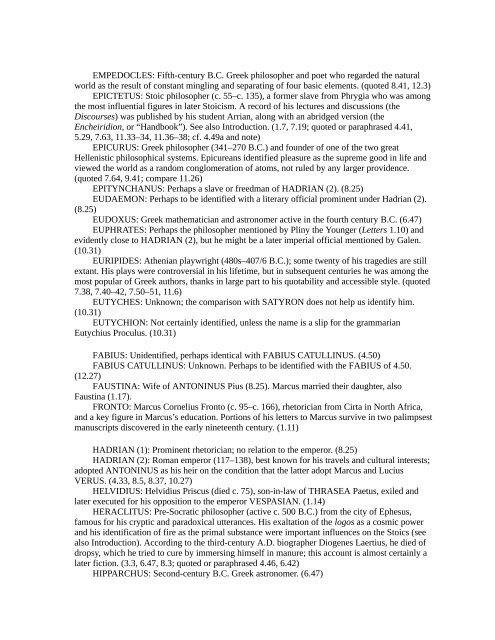9781945186240
You also want an ePaper? Increase the reach of your titles
YUMPU automatically turns print PDFs into web optimized ePapers that Google loves.
EMPEDOCLES: Fifth-century B.C. Greek philosopher and poet who regarded the natural<br />
world as the result of constant mingling and separating of four basic elements. (quoted 8.41, 12.3)<br />
EPICTETUS: Stoic philosopher (c. 55–c. 135), a former slave from Phrygia who was among<br />
the most influential figures in later Stoicism. A record of his lectures and discussions (the<br />
Discourses) was published by his student Arrian, along with an abridged version (the<br />
Encheiridion, or “Handbook”). See also Introduction. (1.7, 7.19; quoted or paraphrased 4.41,<br />
5.29, 7.63, 11.33–34, 11.36–38; cf. 4.49a and note)<br />
EPICURUS: Greek philosopher (341–270 B.C.) and founder of one of the two great<br />
Hellenistic philosophical systems. Epicureans identified pleasure as the supreme good in life and<br />
viewed the world as a random conglomeration of atoms, not ruled by any larger providence.<br />
(quoted 7.64, 9.41; compare 11.26)<br />
EPITYNCHANUS: Perhaps a slave or freedman of HADRIAN (2). (8.25)<br />
EUDAEMON: Perhaps to be identified with a literary official prominent under Hadrian (2).<br />
(8.25)<br />
EUDOXUS: Greek mathematician and astronomer active in the fourth century B.C. (6.47)<br />
EUPHRATES: Perhaps the philosopher mentioned by Pliny the Younger (Letters 1.10) and<br />
evidently close to HADRIAN (2), but he might be a later imperial official mentioned by Galen.<br />
(10.31)<br />
EURIPIDES: Athenian playwright (480s–407/6 B.C.); some twenty of his tragedies are still<br />
extant. His plays were controversial in his lifetime, but in subsequent centuries he was among the<br />
most popular of Greek authors, thanks in large part to his quotability and accessible style. (quoted<br />
7.38, 7.40–42, 7.50–51, 11.6)<br />
EUTYCHES: Unknown; the comparison with SATYRON does not help us identify him.<br />
(10.31)<br />
EUTYCHION: Not certainly identified, unless the name is a slip for the grammarian<br />
Eutychius Proculus. (10.31)<br />
FABIUS: Unidentified, perhaps identical with FABIUS CATULLINUS. (4.50)<br />
FABIUS CATULLINUS: Unknown. Perhaps to be identified with the FABIUS of 4.50.<br />
(12.27)<br />
FAUSTINA: Wife of ANTONINUS Pius (8.25). Marcus married their daughter, also<br />
Faustina (1.17).<br />
FRONTO: Marcus Cornelius Fronto (c. 95–c. 166), rhetorician from Cirta in North Africa,<br />
and a key figure in Marcus’s education. Portions of his letters to Marcus survive in two palimpsest<br />
manuscripts discovered in the early nineteenth century. (1.11)<br />
HADRIAN (1): Prominent rhetorician; no relation to the emperor. (8.25)<br />
HADRIAN (2): Roman emperor (117–138), best known for his travels and cultural interests;<br />
adopted ANTONINUS as his heir on the condition that the latter adopt Marcus and Lucius<br />
VERUS. (4.33, 8.5, 8.37, 10.27)<br />
HELVIDIUS: Helvidius Priscus (died c. 75), son-in-law of THRASEA Paetus, exiled and<br />
later executed for his opposition to the emperor VESPASIAN. (1.14)<br />
HERACLITUS: Pre-Socratic philosopher (active c. 500 B.C.) from the city of Ephesus,<br />
famous for his cryptic and paradoxical utterances. His exaltation of the logos as a cosmic power<br />
and his identification of fire as the primal substance were important influences on the Stoics (see<br />
also Introduction). According to the third-century A.D. biographer Diogenes Laertius, he died of<br />
dropsy, which he tried to cure by immersing himself in manure; this account is almost certainly a<br />
later fiction. (3.3, 6.47, 8.3; quoted or paraphrased 4.46, 6.42)<br />
HIPPARCHUS: Second-century B.C. Greek astronomer. (6.47)


